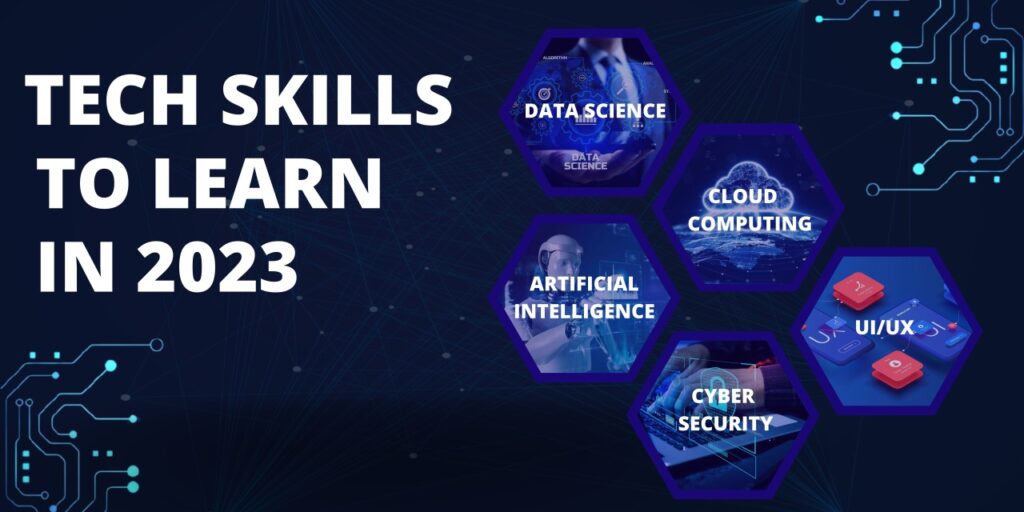Top 5 Computer Skills To Learn in 2023 : With Complete Details

Here Are The Top 5 Computer Skills To Learn In 2023 :
1. Data Science and Analytics
2. Artificial Intelligence and Machine Learning
3. Cybersecurity
4. Cloud Computing
5. Software Development
Remember that the skill landscape can change rapidly, so it’s important to stay updated with industry trends and continuously adapt your skill set to remain competitive. Always research and consider the specific demands of your desired industry and job role when deciding which skills to prioritize.
1. Data Science and Analytics :
With the increasing amount of data being generated, the ability to analyze and extract insights from data remains crucial across various industries.
With the increasing amount of data being generated, the ability to analyze and extract insights from data remains crucial across various industries.
To become proficient in Data Science and Analytics:
You’ll need a combination of technical, analytical, and domain-specific skills. Here are some essential skills for this field:
Programming Languages: Proficiency in languages such as Python or R is crucial for data manipulation, analysis, and modeling.
Statistical Analysis: A strong foundation in statistics helps you understand data distributions, correlations, and make informed decisions.
Machine Learning: Understanding various machine learning algorithms and techniques for predictive modeling and classification is essential.
Data Cleaning and Preprocessing: Cleaning and preparing data for analysis is a significant part of the process, so skills in data preprocessing are crucial.
Data Visualization: Being able to communicate insights effectively through visualizations using tools like Matplotlib, Seaborn, or Tableau is important.
Big Data Technologies: Familiarity with tools like Hadoop, Spark, and NoSQL databases for handling and processing large datasets is beneficial.
Domain Knowledge: Understanding the specific industry you’re working in (e.g., finance, healthcare) helps you apply data analysis to real-world problems.
SQL and Database Management: Proficiency in SQL is important for querying and managing databases to extract the necessary data.
Communication Skills: The ability to explain complex technical concepts to non-technical stakeholders is valuable for data scientists.
Problem-Solving Skills: Data science involves identifying and solving complex problems using data-driven approaches.

As for earnings in the Data Science and Analytics field, salaries can vary widely based on factors such as experience, location, industry, and the specific role. Here is a general overview of the minimum to maximum earning potential in this field:
Minimum Earnings:
Entry-level data science positions might offer salaries ranging from $50,000 to $70,000 per year, depending on the company, location, and other factors.
Maximum Earnings:
Experienced data scientists, especially those with specialized skills and expertise, can earn well into six figures. Salaries of $100,000 to $150,000 or more are not uncommon, and in some cases, salaries can exceed $200,000, particularly in high-demand regions or industries.
Keep in mind that these figures are approximate and can vary significantly. It is important to research salary ranges in your specific geographic area and industry to get a more accurate understanding of earning potential. Additionally, the field of Data Science is evolving, and new roles and opportunities can influence earning potential.
2. Artificial Intelligence and Machine Learning :
AI and machine learning continue to drive automation and innovation in many sectors, including finance, healthcare, marketing, and more.
Becoming proficient in Artificial Intelligence (AI) and Machine Learning (ML):
Involves developing a blend of technical, mathematical, and problem-solving skills. Here are some essential skills for this field:
1. Programming Languages: Strong programming skills in languages like Python or R are essential for implementing AI and ML algorithms.
2. Mathematics and Statistics: A solid foundation in linear algebra, calculus, and statistics is crucial for understanding the underlying concepts of AI and ML algorithms.
3. Machine Learning Algorithms: In-depth knowledge of various machine learning algorithms, such as regression, classification, clustering, and neural networks, is necessary.
4. Data Preprocessing: Cleaning, transforming, and preparing data for training and testing are key aspects of AI and ML work.
5. Deep Learning: Understanding and working with neural networks and deep learning architectures is important for complex tasks like image and speech recognition.
6. Natural Language Processing (NLP): Knowledge of NLP techniques and tools is valuable for applications involving text and language analysis.
7. Reinforcement Learning: Familiarity with reinforcement learning concepts is essential for applications that involve decision-making in dynamic environments.
8. Data Visualization: The ability to create clear visualizations to convey insights from data and model results is important.
9. Version Control: Proficiency in using version control systems like Git helps manage code and collaborate effectively with other team members.
10. Problem-Solving Skills: AI and ML involve tackling complex problems, so strong problem-solving skills are essential.
As for earning potential in the field of Artificial Intelligence and Machine Learning, salaries can vary widely based on factors like experience, location, industry, and the specific role. Here’s a general overview of the minimum to maximum earning potential:

Minimum Earnings:
Entry-level positions or junior roles in AI and ML might offer salaries ranging from $60,000 to $90,000 per year, depending on the company and location.
Maximum Earnings:
Experienced AI and ML professionals, especially those with advanced degrees (like a Ph.D.) and specialized skills, can earn well into six figures. Salaries of $120,000 to $180,000 or more are possible, particularly in high-demand regions or industries.
However, it’s important to note that AI and ML roles often overlap with other technology roles, and the distinctions between titles can be fluid. Additionally, the field of AI and ML is rapidly evolving, which can impact earning potential. Always research the current salary ranges in your specific geographic area and industry to get a more accurate understanding of earning potential.
3. Cybersecurity :
As technology advances, so do cyber threats. Cybersecurity skills are essential for protecting sensitive information and maintaining the integrity of digital systems.
Becoming proficient in cybersecurity:
Requires a mix of technical, analytical, and problem-solving skills, as well as a strong understanding of security concepts and practices. Here are some essential skills for entering the field of cybersecurity:
1. Networking Knowledge: Understanding network protocols, architectures, and vulnerabilities is essential for securing network infrastructure.
2. Security Fundamentals: Knowledge of basic security concepts like encryption, authentication, access control, and risk assessment is crucial.
3. Operating Systems: Proficiency in various operating systems (Windows, Linux, etc.) helps you understand their security configurations and vulnerabilities.
4. Cyber Threats and Attacks: Familiarity with different types of cyber threats, malware, and attack vectors is vital for identifying and mitigating risks.
5. Firewalls and Intrusion Detection Systems: Understanding how firewalls and intrusion detection/prevention systems work is important for network security.
6. Penetration Testing: Learning how to ethically hack systems to identify vulnerabilities and weaknesses is a key aspect of cybersecurity.
7. Vulnerability Assessment: The ability to assess systems for potential vulnerabilities and prioritize their remediation is crucial.
8. Security Tools: Familiarity with security tools like antivirus software, intrusion detection systems, and security information and event management (SIEM) tools is important.
9. Security Standards and Compliance: Understanding security frameworks and compliance regulations (such as GDPR, HIPAA) is necessary, especially in regulated industries.
10. Ethical and Legal Considerations: A strong understanding of ethical hacking practices and legal considerations is important to operate within legal boundaries.
Soft Skills: Communication, problem-solving, attention to detail, and the ability to work under pressure are also essential for a successful cybersecurity career.
As for earning potential in the field of cybersecurity, salaries can vary significantly based on factors such as experience, education, location, and the specific cybersecurity role. Here’s a general overview of the minimum to maximum earning potential:

Minimum Earnings:
Entry-level positions like cybersecurity analysts or junior security engineers might offer salaries ranging from $50,000 to $80,000 per year, depending on the company and location.
Maximum Earnings:
Experienced cybersecurity professionals, especially those in leadership roles or with specialized expertise (such as penetration testers or security architects), can earn well into six figures. Salaries of $100,000 to $150,000 or more are possible, particularly in high-demand regions or industries.
Additionally, the cybersecurity field is continuously evolving due to the changing threat landscape, so staying up to date with the latest skills and certifications is important for career growth. Always research the current salary ranges in your specific geographic area and industry to get a more accurate understanding of earning potential.
4. Cloud Computing :
Cloud technologies enable businesses to scale and operate more efficiently. Proficiency in cloud platforms like AWS, Azure, or Google Cloud can be highly valuable.
To excel in the field of Cloud Computing:
You need a combination of technical skills related to cloud platforms, networking, security, and programming, as well as strong problem-solving abilities and an understanding of cloud architecture. Here are the essential skills for a career in Cloud Computing:
1. Cloud Platform Proficiency: Mastery of popular cloud platforms like Amazon Web Services (AWS), Microsoft Azure, or Google Cloud Platform (GCP) is essential. Learn about services such as compute, storage, databases, networking, and security offered by these platforms.
2. Networking Fundamentals: Understanding networking concepts like IP addressing, subnets, routing, and load balancing is crucial for configuring and managing cloud-based networks.
3. Security Best Practices: Knowledge of cloud security principles, identity and access management (IAM), encryption, and compliance standards is vital to ensure the security of data and applications in the cloud.
4. DevOps and Automation: Familiarity with tools like Docker, Kubernetes, and Terraform for automation, orchestration, and infrastructure as code (IaC) is important for efficient cloud management.
5. Programming and Scripting: Proficiency in programming languages like Python, Java, or PowerShell is valuable for cloud automation, integration, and creating custom solutions.
6. Serverless Computing: Understanding serverless architecture and services like AWS Lambda or Azure Functions can help optimize resource utilization and cost.
7. Database Management: Familiarity with cloud-based databases like Amazon RDS, Azure SQL Database, or Google Cloud SQL is essential for data storage and management.
8. Cloud Monitoring and Troubleshooting: Skills in monitoring cloud resources, identifying performance bottlenecks, and troubleshooting issues are important for maintaining reliable cloud environments.
9. Cloud Security Certifications: Earning certifications like AWS Certified Solutions Architect, Azure Security Engineer, or Google Professional Cloud Security Engineer can validate your cloud security expertise.
10. Soft Skills: Communication, teamwork, and adaptability are crucial for collaborating with teams and clients to design, implement, and manage cloud solutions effectively.

As for the earning potential in the field of Cloud Computing, salaries can vary widely based on factors like experience, cloud platform expertise, location, and the specific role. Here’s a general overview of the minimum to maximum earning potential:
Minimum Earnings:
Entry-level cloud-related positions like cloud support engineer might offer salaries ranging from $50,000 to $80,000 per year, depending on the company and location.
Maximum Earnings:
Experienced cloud professionals, especially those with specialized certifications and expertise in cloud architecture, security, or DevOps, can earn well into six figures. Salaries of $100,000 to $150,000 or more are possible, particularly in high-demand regions or industries.
As cloud computing continues to be a crucial part of modern IT infrastructure, the demand for skilled professionals in this field remains high. Keep in mind that salaries can vary significantly based on the factors mentioned earlier, so it’s important to research the current salary ranges in your specific geographic area and industry.
5. Software Development :
Coding and software development skills remain in demand. Full-stack development, mobile app development, and web development are areas worth considering.
Becoming a successful software developer:
Requires a combination of technical skills, problem-solving abilities, teamwork, and a willingness to continuously learn and adapt to new technologies. Here are some essential skills for a career in software development:
1. Programming Languages: Proficiency in programming languages such as Python, Java, JavaScript, C++, or others, depending on the type of development you’re interested in.
2. Software Development Tools: Familiarity with integrated development environments (IDEs), version control systems like Git, and collaboration tools is important.
3. Problem-Solving and Logic: Strong logical and problem-solving skills to design and implement efficient, scalable, and reliable solutions.
4. Algorithms and Data Structures: Understanding algorithms and data structures is crucial for writing efficient and optimized code.
5. Web Development: Knowledge of front-end (HTML, CSS, JavaScript) and back-end (server-side programming, databases) development is valuable for building web applications.
6. Mobile App Development: Skills in developing mobile apps for platforms like iOS (Swift) or Android (Kotlin or Java) if you’re interested in mobile development.
7. Full-Stack Development: Proficiency in both front-end and back-end development to create end-to-end applications.
8. Database Management: Knowledge of database design, querying languages (SQL), and database management systems is important.
9. Agile Development: Familiarity with agile methodologies like Scrum or Kanban for efficient project management and collaboration.
10. Testing and Debugging Understanding of software testing techniques and debugging to ensure code quality.
11. Continuous Integration/Continuous Deployment (CI/CD): Skills in automating software deployment processes to achieve faster development cycles.
12. Soft Skills: Communication, teamwork, time management, and adaptability are essential for collaborating with teams and delivering projects effectively.

Minimum Earnings:
Entry-level software development positions, such as junior developers or interns, might offer salaries ranging from $50,000 to $80,000 per year, depending on the company and location.
Maximum Earnings:
Experienced software developers, especially those with specialized expertise, senior roles, or leadership positions, can earn well into six figures. Salaries of $100,000 to $150,000 or more are possible, particularly in high-demand regions or industries.
It’s important to note that software development encompasses various roles, including front-end, back-end, full-stack, mobile, and more. Salaries can vary significantly based on factors like the specific programming languages, technology stacks, industry, location, and the size of the company. Always research the current salary ranges in your specific geographic area and industry to get a more accurate understanding of earning potential. Additionally, the field of software development is constantly evolving, so staying up-to-date with the latest technologies and best practices is essential for career growth.






2 thoughts on “Top 5 Computer Skills To Learn in 2023 : With Complete Details”